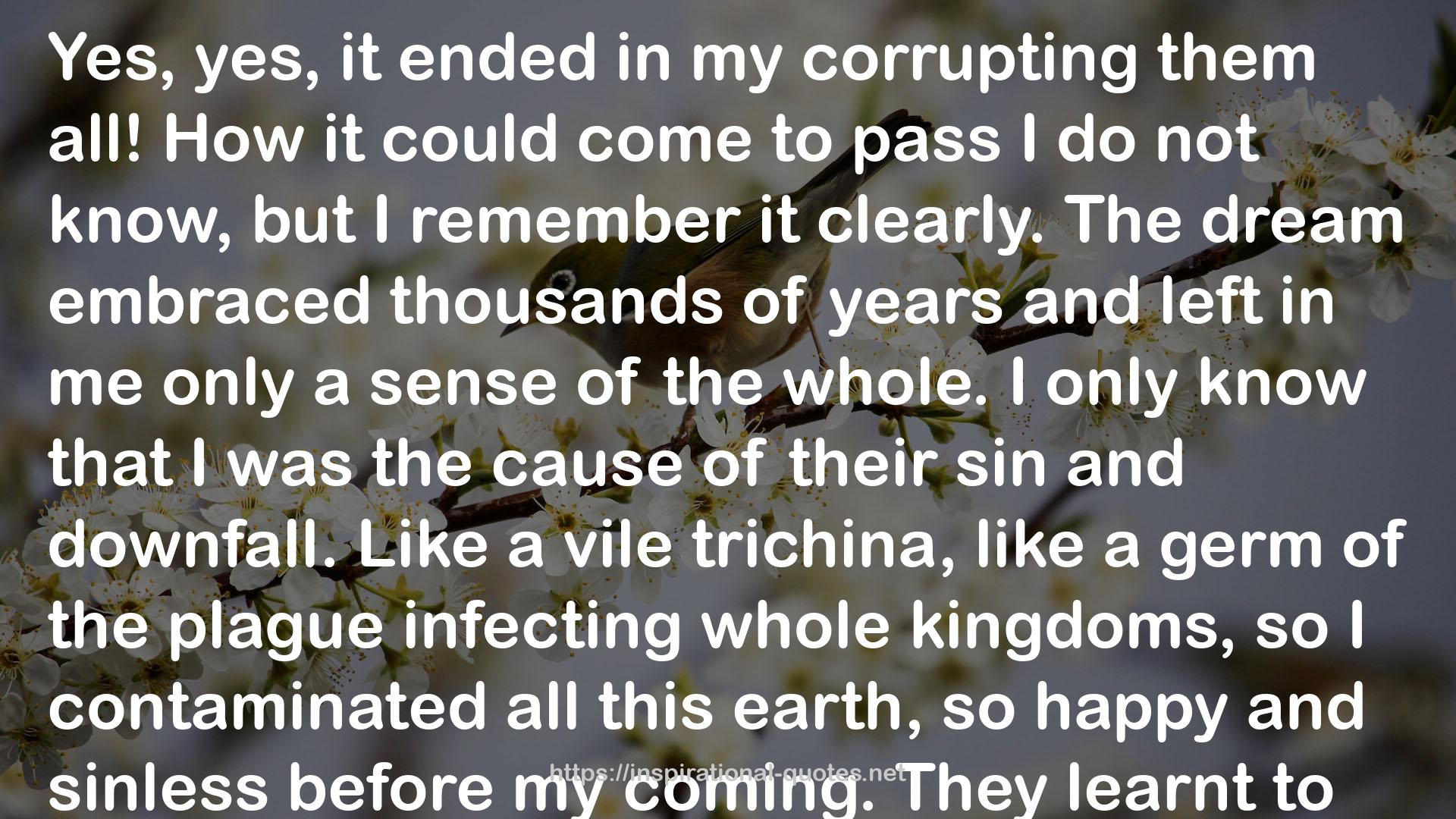" Yes, yes, it ended in my corrupting them all! How it could
come to pass I do not know, but I remember it clearly. The
dream embraced thousands of years and left in me only a
sense of the whole. I only know that I was the cause of their
sin and downfall. Like a vile trichina, like a germ of the
plague infecting whole kingdoms, so I contaminated all this
earth, so happy and sinless before my coming. They learnt
to lie, grew fond of lying, and discovered the charm of
falsehood. Oh, at first perhaps it began innocently, with a
jest, coquetry, with amorous play, perhaps indeed with a
germ, but that germ of falsity made its way into their hearts
and pleased them. Then sensuality was soon begotten,
sensuality begot jealousy, jealousy - cruelty . . . Oh, I don't
know, I don't remember; but soon, very soon the first blood
was shed. They marvelled and were horrified, and began to
be split up and divided. They formed into unions, but it was
against one another. Reproaches, upbraidings followed.
They came to know shame, and shame brought them to
virtue. The conception of honour sprang up, and every union
began waving its flags. They began torturing animals, and
the animals withdrew from them into the forests and became
hostile to them. They began to struggle for separation, for
isolation, for individuality, for mine and thine. They began
to talk in different languages. They became acquainted with
sorrow and loved sorrow; they thirsted for suffering, and said
that truth could only be attained through suffering. Then
science appeared. As they became wicked they began talking
of brotherhood and humanitarianism, and understood those
ideas. As they became criminal, they invented justice and
drew up whole legal codes in order to observe it, and to
ensure their being kept, set up a guillotine. They hardly
remembered what they had lost, in fact refused to believe that
they had ever been happy and innocent. They even laughed
at the possibility o this happiness in the past, and called it a
dream. They could not even imagine it in definite form and
shape, but, strange and wonderful to relate, though they lost
all faith in their past happiness and called it a legend, they so
longed to be happy and innocent once more that they
succumbed to this desire like children, made an idol of it, set
up temples and worshipped their own idea, their own desire;
though at the same time they fully believed that it was
unattainable and could not be realised, yet they bowed down
to it and adored it with tears! Nevertheless, if it could have
happened that they had returned to the innocent and happy
condition which they had lost, and if someone had shown it
to them again and had asked them whether they wanted to go
back to it, they would certainly have refused. They answered
me:
"We may be deceitful, wicked and unjust, we know it and
weep over it, we grieve over it; we torment and punish
ourselves more perhaps than that merciful Judge Who will
judge us and whose Name we know not. But we have
science, and by the means of it we shall find the truth and we
shall arrive at it consciously. Knowledge is higher than
feeling, the consciousness of life is higher than life. Science
will give us wisdom, wisdom will reveal the laws, and the
knowledge of the laws of happiness is higher than
happiness. "
Image for Quotes
 weep over it, we grieve over it; we torment and punish
weep over it, we grieve over it; we torment and punishourselves more perhaps than that merciful Judge Who will
judge us and whose Name we know not. But we have
science, and by the means of it we shall find the truth and we
shall arrive at it consciously. Knowledge is higher than
feeling, the consciousness of life is higher than life. Science
will give us wisdom, wisdom will reveal the laws, and the
knowledge of the laws of happiness is higher than
happiness." style="width:100%;margin:20px 0;"/>